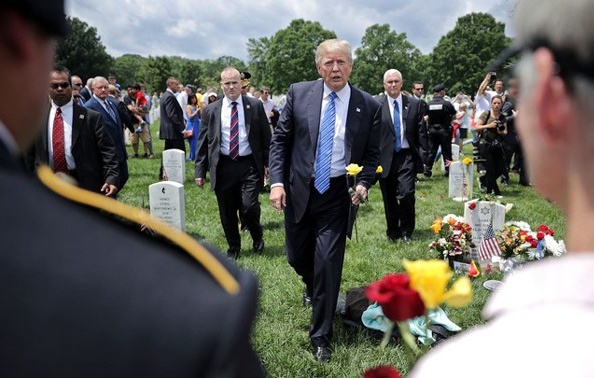Donald Trump at Arlington National Cemetery, May 2017: “I don’t get it. What was in it for them?” (Chip Somodevilla/Getty)
Multiple sources tell The Atlantic say Donald Trump refused to visit an American military cemetery near Paris in November 2018 because the war dead were “losers” and “suckers”.
At the time of the incident, on the 70th anniversary of the end of World War I, Trump blamed rain for his refusal, falsely claiming that “the helicopter couldn’t fly” and that the Secret Service would not drive him to the Aisne-Marne American Cemetery.
But “four people with first-hand knowledge of the discussion” said Trump feared his hair would become disheveled in the rain.
They added that he told senior staff members in the morning, “Why should I go to that cemetery? It’s filled with losers.” In another conversation, Trump called the more than 1,800 marines who lost their lives at Belleau Wood “suckers” for getting killed.
“Bone Spurs” and Contempt for Veterans
Trump avoided military service during the Vietnam War with a doctor’s note which declared that he had bone spurs in his feet.
He has mocked those who were in Vietnam, including the late Sen. John McCain, a Navy pilot who spent 5 1/2 years as a prisoner of war in North Vietnam. “He’s not a war hero,” Trump said in 2015. “I like people who weren’t captured.”
When McCain died in August 2018, Trump told his senior staff, according to “three sources with direct knowledge”, “We’re not going to support that loser’s funeral.” When he saw flags lowered to half-staff, he exclaimed, “What the fuck are we doing that for? Guy was a fucking loser.”
On at least two occasions since becoming President, according to “three sources with direct knowledge”, Trump said former President George H. W. Bush was a “loser” because he was shot down by the Japanese as a Navy pilot in World War II.
During his 2016 campaign, Trump assailed the parents of Humayun Khan, an Army captain who was killed in Iraq in 2004.
On Memorial Day in May 2017, Trump visited Arlington National Cemetery with John Kelly, Homeland Security Director and later White House chief of staff. As they stood at the grave of Kelly’s son Robert, killed in 2010 in Afghanistan, Trump said, “I don’t get it. What was in it for them?”
And after a White House briefing by the Chairman of the Joint Chiefs of Staff, Gen. Joseph Dunford, Trump turned to aides and said, “That guy is smart. Why did he join the military?”
Trump: Sources Are “Lowlifes”
Throughout Thursday, Trump gave garbled denials of the accounts, attacking the sources.
He shouted at reporters as he left for an appearance in Pennsylvania:
If people really exist that would have said that, they’re lowlifes and they’re liars.
And I would be willing to swear on anything that I never said that about our fallen heroes. There is nobody that respects them more. What animal would say such a thing?
He repeated his false claims about the France incident: “It was raining about as hard as I’ve ever seen. And on top of that, it was very, very foggy. And the helicopter was unable to fly…The Secret Service told me, “You can’t do it [drive through Paris. I said, “I have to do it. I want to be there.” They said, “You can’t do it.”
Late last night, Trump posted a rambling tweet that insisted — contrary to multiple sources at the time as well as the testimonies to The Atlantic — that he approved the honoring of McCain, including the lowering of flags to half-mast, “without hesitation or complaint”.
“I never called our great fallen soldiers anything other than HEROES,” he insisted.
As he seeks re-election, Trump has struggled to hold the military support given to the Republican Party. A poll by The Military Times, conducted last month and released this week, showed Democratic Presidential candidate Joe Biden leading Trump with 41% to 37% percent among active-duty troops.
Biden — whose late son Beau was a veteran — said in an statement that The Atlantic article, if true, showed “another marker of how deeply President Trump and I disagree about the role of the president of the United States”.
I have long said that, as a nation, we have many obligations, but we only have one truly sacred obligation — to prepare and equip those we send into harm’s way, and to care for them and their families, both while they are deployed and after they return home. That’s the foundation of what [my wfie] Jill and I believe.
If I have the honor of serving as the next commander in chief, I will ensure that our American heroes know that I will have their back and honor their sacrifice — always.

